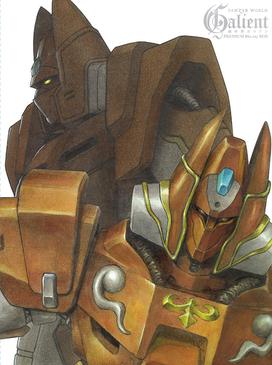Top Qs
Timeline
Chat
Perspective
Panzer World Galient
Japanese anime television series From Wikipedia, the free encyclopedia
Remove ads
Panzer World Galient (機甲界ガリアン, Kikōkai Garian) is a 1984 Japanese fantasy and science fiction anime television series produced by Sunrise.[1] It was directed by Ryōsuke Takahashi and written by Sōji Yoshikawa with mechanical design by Kunio Okawara and Yutaka Izubuchi. It aired on Nippon Television in Japan from October 5, 1984, to March 29, 1985, lasted up to 25 episodes. It is the third installment of the Takahashi Mecha Trilogy, following both Armored Trooper Votoms and Fang of the Sun Dougram, respectively.
This article needs additional citations for verification. (February 2013) |
Remove ads
Plot
Set in the medieval-looking fantasy world of Arst, Prince Jordy Volder takes up the fight against the conqueror Marder. Jordy uses the legendary giant robot "panzer" Galient, which is one of many panzers preserved underground for millennia. Using an army of advanced robot panzers, Marder is conquering Arst in preparation to dominate the Crescent Galaxy.
The final episode ended with a tighter daylight shot on the sword that pans to the handle. Prince Jordy's hand then pulls the sword from the sand and lifts it in the air and we see him embracing Chururu. The credits flash onscreen as the Prince and Chururu look at each other while the images of the prince's mother and friends appear onscreen with rose petals blowing in the wind completing the ending.
Remove ads
Theme music
- Opening Theme: "The Galient World – Run For Your Life" by EUROX
- Ending Theme: "Hoshi no Ichibyō" (lit. "A Second of a Star") by EUROX
The show's opening and ending musical themes were composed and performed by EUROX, a Japanese progressive rock band formed in 1984 in Tokyo. They did English versions of both songs with mostly different lyrics. They also did a 2009 remake of both songs in both languages.
The ending theme was normally accompanied by nighttime shots of a sword stuck in the sand and images of the characters reflected on its blade as the credits flash with the ending showing the same sword now showered with rain (as reference to a line in the song about crying).
Remove ads
References
External links
Wikiwand - on
Seamless Wikipedia browsing. On steroids.
Remove ads

